-

人教版新目标初中英语八年级下册It’s a nice day, isn’t it教案2篇
"Hello! Welcome to English class! Introduce yourself. Meet your new classmates." That's what the teacher says. What do you say? "Oh no!" It can be difficult talking to new people. But it can be fun, and you can make friends. How do you do it? Make small talk. Small talk is polite conversation. "Wang Nan is a great pingpang player, isn't she?" "I'd love to meet her, wouldn't you?" "It's been raining a lot, hasn't it?" Tag questions are a form of polite speech. To make small talk successfully, you should know how to make them. You should also know what topics to talk about. Try to learn this unit carefully. The next time you're in English class, you'll find out. Making small talk's easy, isn't it? (“你好!欢迎你!请做一下自我介绍。认识一下你的新同学。”通常在课上老师会这样说。你会说什么呢?“噢,不!”与陌生人谈话太困难了。但是这也很有意思,并且你还能交到朋友。你该怎么做呢?闲聊。闲聊指得是礼貌的对话。“王楠是一个很棒的乒乓球运动员,不是吗?”“我希望自己能认识她,你呢?“今年的雨水很多,不是吗?”反意疑问句是一种礼貌用语。为了使得谈话成功,你应该知道怎样去进行闲聊。你还应该知道与不同的人该谈论什么样的话题。认真的学习这个单元吧,下次在英语课上,你会发现与大家展开谈话是一件很容易的事情,不信我们来试试。)

人教版新目标初中英语八年级下册He said I was hard-working教案2篇
This activity introduces some new vocabulary and provide oral practice using the target language.Task 1 . Ask four students to stand in front of the class, and the teacher asks them the following questions as a reporter.1.What are you going to do when you grow up?2.What are you going to do next week?3.What are going to do after school?The students will give different answers, then ask a good student to report what they said.I am going to e a doctor.What did she say?----------She said she was going to be a doctor.I am going to have a party on Friday night.What did he say?-------He said he was going to have a party on Friday night.I am going to do my homework.What did she say ?------ She said she was going to do her homework.I am going home after school.What did she say?-----She said she was going home after school.Say In this unit we are going to learn to use words like to report what someone said.Task 2. Read the instructions. Then ask a student to read the four questions. And write the words on the Bb. Explain what soap opera is.Task 3. Ask the students to Look at the pictures, point out the TV screens in the picture. Ask one girl to read what Marcia said.What did Marcia say? She said She said she was having a surprise party for Lana on Friday night. Repeat the other pictures in the same way.Activity3. Listen and number the pictures in activity 1a.

人教版新目标初中英语八年级下册What were you doing when the UFO arrived教案2篇
(一).知识方面: 1.培养学生能运用过去进行时来描述、谈论过去某个时间正在发生的事情或动作的意识和能力,能就过去某个时间正在发生的动作做出正确的描述。 2.培养学生的想象力和角色扮演的合作能力。 3.培养学生讲述过去发生的事情经过的能力。能正确运用一般过去时来讲述故事。 (二).技能方面: 1.本单元的语言目标是Talk about past events and tell a story(谈论过去的时间和讲述一个故事),围绕这一目标,要涉及句型: What were you doing when the UFO arrived? ----I was sitting in the barber’s chair. The barber was cutting my hair. 因此必须学习standing、studying、cleaning、sleeping、cooking、making、eating、cutting、等表示地点的词,以便为上述句型提供语言材料。2.学习过去进行时的有关知识。Was/were+现在分词,是该时态的表达式。 3.在学习过程中,要区分The boy was walking down the street when the UFO landed.和While the boy was walking down the street, the UFO landed.这两种由when和while引导的状语从句的句型结构。注意它们的不同。
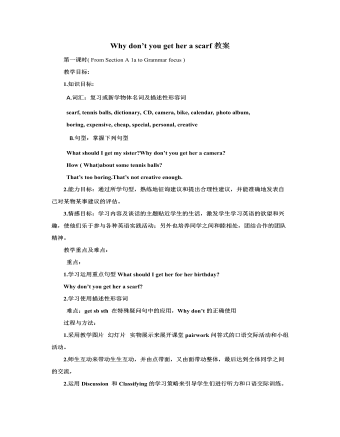
人教版新目标初中英语八年级下册Why don’t you get her a scarf教案
教师带领学生复习有关描述宠物的词汇,采用教师提问学生回答的方进行。如:T:What animals do you think would be good pets?What animals do you think would be bad pets?What do you think are good animals for a six-year-old child?然后学生进行 pairwork 练习。Task two: 师生互动,学习探究 1、播放3a部分的录音,引导学生一边听录音,一边跟读。2、通过听录音学生回答以下问题:Why do you think pot-bellied pigs are popular?What are the advantages and disadvantages of keeping such a pet?教师对学生的回答进行及时点评。3.学习范文,学习重点短语,为下步的模仿写作提供语言素材。T :1. )Have you ever kept a pig as a pet?Do you like pigs? St.:No.…Why don’t you like to keep a pig? St: No.They’re too dirty and lazy(Do you know in some foreign countries like Hollyland, Australia,pigs are the most popular pet.there’s a kind of pig.(图)it has an interesting name? it ‘s called a pot-bellied pig.) Now,let’s learn an article about this kind of interesting pet.2.)play the tapeSt.:Listen and repeat3.)show some Qs on computer(本子St.: read silently,then answerthe Qs(本子)4.)Ask ss. Close book and retell this passage.(what is a pot-bellied pig? Is it a good or bad pet? ) St.: retell it to each other“A pot –bellied pig is a popular pet now…”5.read the article together.St.:.practice reading
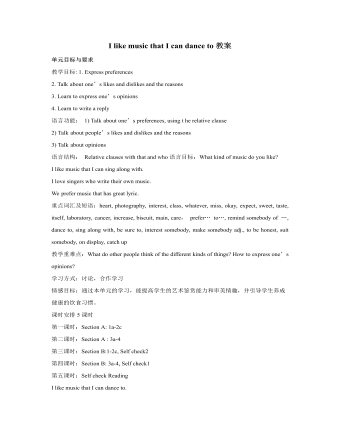
人教版新目标初中英语九年级上册I like music that I can dance to教案
教学目标: 1. Express preferences2. Talk about one’s likes and dislikes and the reasons3. Learn to express one’s opinions 4. Learn to write a reply 语言功能: 1) Talk about one’s preferences, using t he relative clause2) Talk about people’s likes and dislikes and the reasons3) Talk about opinions语言结构: Relative clauses with that and who语言目标:What kind of music do you like?I like music that I can sing along with.I love singers who write their own music.We prefer music that has great lyric.重点词汇及短语:heart, photography, interest, class, whatever, miss, okay, expect, sweet, taste, itself, laboratory, cancer, increase, biscuit, main, care, prefer… to…, remind somebody of …, dance to, sing along with, be sure to, interest somebody, make somebody adj., to be honest, suit somebody, on display, catch up教学重难点:What do other people think of the different kinds of things? How to express one’s opinions? 学习方式:讨论,合作学习情感目标:通过本单元的学习,能提高学生的艺术鉴赏能力和审美情趣,并引导学生养成健康的饮食习惯。课时安排5课时第一课时:Section A: 1a-2c第二课时:Section A : 3a-4第三课时:Section B:1-2c, Self check2第四课时:Section B: 3a-4, Self check1第五课时:Self check ReadingI like music that I can dance to.

人教版新目标初中英语九年级下册By the time I got outside, the bus had already left教案
Ⅰ. Teaching Aims and Demands1. Knowledge Objects(1) Key Vocabularyoversleep(2) Target LanguageWhat happened?I overslept. And by the time I got up, my brother had already gotten in the shower.2. Ability Objects(1) Teach the students to use the new words.(2) Train the students to narrate past events with the Past Perfect Tense.(3) Train the students' listening and speaking skills with the target language.3. Moral ObjectIt’s a good habit to go to bed early in the evening and get up early in the morning. So you’ll never be in a hurry in the morning.Ⅱ. Teaching Key Points1. Key Vocabularyoversleep2. Target LanguageNarrate past events with the Past Perfect TenseⅢ. Teaching Difficult Points1. Train the students to narrate past events with the Past Perfect Tense.2. Train the students to understand the target language in spoken conversation.Ⅳ. Teaching Methods1. Thinking of examples from the students' real lives.2. Making sentences by looking at the pictures.Ⅴ. Teaching AidA tape recorderⅥ. Teaching ProceduresStep I Revision1. Revise the language points in Unit 8.Ask some questions like this: What volunteer work would you like to do?Help the students to answer, I’d like to…/I love to…/I hope to2. Practice the dialogue in Activity 3c on page 62 again. Get students to role play the similar dialogues with the following.

人教版新目标初中英语九年级上册Where would you like to visit教案2篇
The First PeriodⅠ.Teaching Aims and DemandsKnowledge Objects(1) Key Vocabularytiring, educational, fascinating, thrilling, peaceful, exotic, trek, jungle, take it easy, explore, historic, site(2) Target LanguageWhere would you like to go on vacation?I’d like to trek through the jungle, because I like exciting vacations.2. Ability Objects(1)Train students to talk about places they would like to visit with the target language.(2)Train students to describe vacations with different adjectives.(3)Train students' listening skill.3. Moral Object,It′s more interesting to go on vacating somewhere instead of staying at home.Ⅱ. Teaching Key Points1. Key Vocabularytiring, educational, fascinating, thrilling, peaceful, exotic, trek, jungle, take it easy, explore, historic, site2. Target LanguageTalk about different places with the target language.Ⅲ. Teaching Difficult Points1. Describe vacations with different adjectives.2. Talk about different places with the target language.Ⅳ. Teaching Methods1. Teaching by illumination2. Teaching by doing chain drills3. Teaching by pairworkⅤ. Teaching Aids1. A tape recorder2. Some pictures of different places with famous views

人教版新目标初中英语九年级下册Rainy days make me sad教案
1. 教材分析本单元以how do things affect you?为话题, 从颜色、天气、音乐、广告、产品等方面谈论了外界事物如何影响人的心情。要求学生掌握表达某物或某事给人带来的感觉、看法或影响等。共设计了四个部分的内容:Section A 该部分有4个模块:第一模块围绕Which restaurant would you like to go to?这一话题展开思维(1a)、听力(1b)、口语(1c)训练;第二模块围绕How does music affect you? 进行听力(2a-2b)、口语训练(2c);第三模块继续围绕how do colors in the restaurant affect you这一话题展开训练,训练形式为阅读和问题体验(3a)和小组活动(3b);第四模块仍就How do things affect you这一话题以调查的形式展开讨论。Section B该部分有4个模块:第一模块围绕产品广告对人们的影响这一话题以“配对”(1a)与“列举”(1b)两种形式展开训练;第二模块继续围绕How do things affect you? 进行听力(2a-2b)、口语对话训练(2c);第三模块围绕“Advertising”这一话题展开阅读(3a-3b)和写作(3c)训练;第四模块围绕How posters affect you这一话题以口语训练形式展开小组活动。

人教版新目标初中英语九年级下册I’ll help clean up the city parks教案
Talk about offering help (P60)I’ll help clean up the city parks.A: I’d like to work ...B: You could help ...Talk about ways to tell people about the Clean-Up Day (P61)We need to ...We can’t ...I’ll ...Talk about the work the volunteers do (P62)These three students all volunteer their time to help other people.Somebody loves to ... / helps ... / plans to ... / wants to ...A: What do you like doing?B: I like ... A: What kind of volunteer work do you think I could do?B: You could ...1. 重点词汇advertisement, fix, repair, pleasure, blind, deaf, shut, carry, specially, fetch2. 认读词汇hunger, homeless, cheer, clean-up, sign, establish, major, commitment, elementary, veterinarian, coach, similar, call-in, strategy, disabled, organization, unable, support, appreciate, donation, part of speech, pronoun, adverb, preposition, conjunction, donate, Jimmy, Sally3. 词组clean up, cheer up, give out, put off, set up, think up, take after, fix up, give away, put up, hand out, work out, at once

人教版新目标初中英语九年级下册You’re supposed to shake hands教案
教学目标:1. 掌握本单元一些重点词汇的写法和用法。2. 学会自如谈论餐桌礼仪。Step 1 RevisionAsk some students to retell the customs at the table in France in the passage in 3a.Step 2 Self checkPart 1. Fill in each bland with the correct word given. Students do the exercises by themselves at first. Then check the answers. Ask the students to comprehend the sentences and help them point out uses of some words, like “arrive (at / in) sw., spend time / money on sth , spend time / money (in) doing sth.”Part 2. Read about Fan Ling’s experience in a western restaurant. Understand the passage. Point out some key points in the passage.1. be / get used to doing sth. 习惯做某事2. begin with = start with 以….开头3. crowd v. 挤满,塞满 the crowd 人群 crowded adj. 拥挤的Then students discuss about how she would solve her problem. Ask some to share their stories with others.Part 3. Complete the crossword by looking at the sentences on the left. Then check the answers.
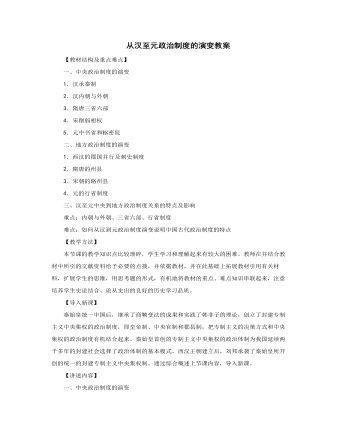
人教版高中历史必修1从汉至元政治制度的演变教案
【教学方法】本节课的教学知识点比较琐碎,学生学习和理解起来有较大的困难。教师在并结合教材中所引的文献资料给予必要的点拨,并依据教材,并在此基础上拓展教材引用有关材料,扩展学生的思维,用思考题的形式,有机地将教材的重点、难点知识串联起来,注意培养学生史论结合、论从史出的良好的历史学习品质。【导入新课】秦始皇统一中国后,继承了商鞅变法的成果和实践了韩非子的理论,创立了封建专制主义中央集权的政治制度,即皇帝制、中央官制和郡县制,把专制主义的决策方式和中央集权的政治制度有机结合起来。秦始皇首创的专制主义中央集权的政治体制为我国延续两千多年的封建社会选择了政治体制的基本模式。西汉王朝建立后,刘邦承袭了秦始皇所开创的统一的封建专制主义中央集权制。通过综合概述上节课内容,导入新课。
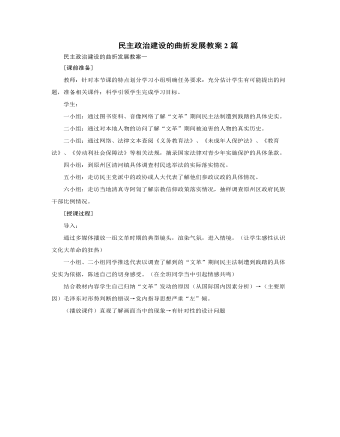
人教版高中历史必修1民主政治建设的曲折发展教案2篇
3.法律制度走向健全关于法律制度走向健全的历史条件,可指导学生阅读教材相关段落,教师适当补充说明,得出结论:提出法制建设方针并着手平反冤假错案,这是恢复和加强民主法制建设的重要举措。为全面开展法制建设准备了政治基础。关于法制建设方针的提出,可由教师补充材料,使学生理解加强法制建设的必要性,如:邓小平会见意大利记者奥琳埃娜?法拉奇(1980年8月)“奥:我看不出怎样才能避免或防止再发生诸如“文化大革命”这样可怕的事情。”“邓:这要从制度方面解决问题。我们过去的一些制度,实际上受了封建主义的影响,包括个人迷信、家长制或家长作风,甚至包括干部职务终身制。我们现在正在研究避免重复这种现象,准备从改革制度着手。我们这个国家有几千年封建社会的历史,缺乏社会主义的民主和社会主义的法制。现在我们要认真建立社会主义的民主制度和社会主义法制。只有这样,才能解决问题。”

人教版高中历史必修1世界多极化趋势的出现教案2篇
一、 教学目标 (一)知识与能力通过了解多极化趋势和对世界的影响、欧盟的形成和扩展、日本成为经济大国的过程和原因、中国和第三世界的崛起等基本史实,培养学生综合探究和归纳知识的能力(二)过程与方法以合作学习的“创设情境—目标显示—自学尝试—合作学习—成果汇报—总结评价”模式为主线,以学生自主探究活动为主体,以教师点拨为主导,以培养学生学习的兴趣和能力为中心,来优化课堂教学。教师创设重大国际事件的情境,让学生亲自探索各个主要国家对朝鲜战争和伊拉克战争立场和态度的决策,培养学生解读历史信息能力,并能够根据自身的实际情况和外部环境,正确应对重大事件。 (三)情感态度与价值观提高学生对二战后美苏两极以外的各种政治经济力量增长的认识,初步理解世界多极化趋势的形成及影响,树立世界走向多极化是不可阻挡的历史潮流的价值判断标准。
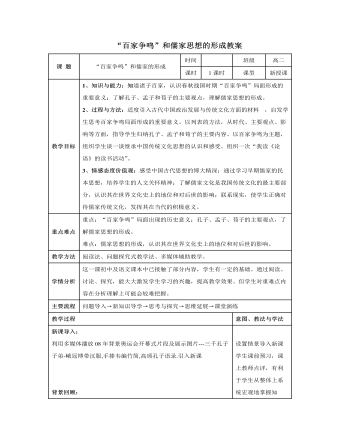
人教版高中历史必修3“百家争鸣”和儒家思想的形成教案
1、知识与能力:知道诸子百家,认识春秋战国时期“百家争鸣”局面形成的重要意义;了解孔子、孟子和荀子的主要观点,理解儒家思想的形成。2、过程与方法:适度引入古代中国政治发展与传统文化方面的材料 ,启发学生思考百家争鸣局面形成的重要意义。以列表的方法,从时代、主要观点、影响等方面,指导学生归纳孔子、孟子和荀子的主要内容。以百家争鸣为主题,组织学生谈一谈继承中国传统文化思想的认识和感受。组织一次“我读《论语》的读书活动”。3、情感态度价值观:感受中国古代思想的博大精深:通过学习早期儒家的民本思想,培养学生的人文关怀精神;了解儒家文化是我国传统文化的最主要部分,认识其在世界文化史上的地位和对后世的影响;联系现实,使学生正确对待儒家传统文化,发挥其在当代的积极意义。

人教版高中历史必修2第二次工业革命教案2篇
请回答:根据上述材料,概述第二次工业革命兴起的主要原因。〖参考答案〗①政治上,资本主义制度在世界范围内的确立,为第二次工业革命提供了政权保障。②市场上,世界市场进一步拓展,推动生产进步发展。③科技上,19世纪自然科学的飞速发展与重大突破。④劳动力上,拥有更多、素质更好的自由劳动力。⑤经济上,拥有更加雄厚的资本。探索攻关二:第二次工业革命与垄断组织的出现的关系材料一第二次工业革命产生的新兴工业部门,在厂房、设备、技术要求和产品结构的复杂性等方面,都对生产组织提出了新的要求。这是过去的独家企业无法满足的,而且一般没有足够的资金。……于是,集中资金的合股公司迅速增加起来,起大型企业垄断组织也就应运而生。
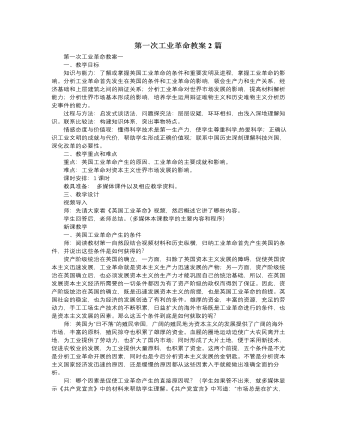
人教版高中历史必修2第一次工业革命教案2篇
一、教学目标知识与能力:了解或掌握英国工业革命的条件和重要发明及进程,掌握工业革命的影响。分析工业革命首先发生在英国的条件和工业革命的影响,领会生产力和生产关系,经济基础和上层建筑之间的辩证关系;分析工业革命对世界市场发展的影响,提高材料解析能力;分析世界市场基本形成的影响,培养学生运用辩证唯物主义和历史唯物主义分析历史事件的能力。过程与方法:启发式谈话法,问题探究法:层层设疑,环环相扣,由浅入深地理解知识。联系比较法:构建知识体系,突出事物特点。情感态度与价值观:懂得科学技术是第一生产力,使学生尊重科学,热爱科学;正确认识工业文明的成就与代价,帮助学生形成正确价值观;联系中国历史深刻理解科技兴国,深化改革的必要性。二、教学重点和难点重点:英国工业革命产生的原因、工业革命的主要成就和影响。难点:工业革命对资本主义世界市场发展的影响。课时安排:1课时教具准备: 多媒体课件以及相应教学资料。

人教版高中历史必修2战后资本主义的新变化教案2篇
1、知识与能力:(1)识记:20 世纪 50 ~70 年代国家干预经济的政策、 70年代的经济“滞胀”“混合经济”;福利国家;第三产业的蓬勃发展;“新经济”的出现;(2)理解当代资本主义的新变化的实质是资本主义的自我扬弃,是在资本主义内部的自我改善,是资本主义生产关系的自我调整;(3)掌握以美国为代表的主要资本主义国家在战后的经济发展历程,分析各国经济发展的共同原因。2、过程与方法:(1)引导学生利用教材和相关史料,培养归纳、再现历史事件的能力,提高学生的历史思维能力;通过讨论提高学生的思辨能力,培养学生全面客观地分析问题的思维方式。(2)学生通过观察1977年发达国家国有经济比重表,懂得提取有效信息、分析数据的能力;(3)学生通过思考讨论西方福利制度的利弊,培养全面、客观分析和比较历史现象,辩证地观察和分析历史问题的能力。
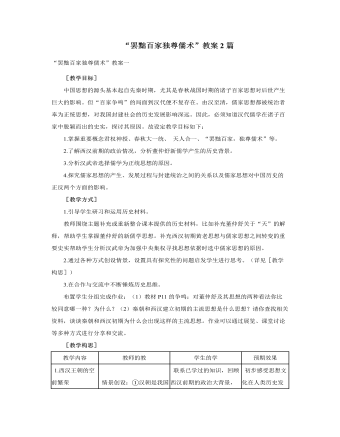
人教版高中历史必修3“罢黜百家独尊儒术”教案2篇
战国阴阳五行家邹衍认为,历史中的朝代更替是由于五德运行产生的影响。按照邹衍的学说,每个朝代必须与五德之一相连,因此,这个朝代就应当遵循这五德之一的要求来运转。董仲舒修改了这个理论,认为朝代的更替不是依循五德运行的顺序,而是依循“三统”,即黑统、白统、赤统的顺序。他在《三代改制质文》中说:每个朝代都依循一统,每统又各有其为政的系统。按董仲舒的说法,夏朝代表黑统,商朝代表白统;周朝则是赤统。夏、商、周三朝完成了这一历史循环。之后,历史又开始一次新的循环,新的朝代又应当代表黑统。继承周朝统治的既不是秦朝,也不是汉朝,而是孔子,他承受天命,创立了黑统。孔子所受天命,不是一种“法统”,而是一种“道统”。董仲舒说:“《春秋》大一统者,天地之常经,古今之通谊也。今师异道,人异论,百家殊方,指意不同,是以上亡以持一统;法制数变,下不知所守。臣愚以为诸不在六艺之科孔子之术者,皆绝其道,勿使并进。邪辟之说灭息,然后统纪可一而法度可明,民知所从矣。”

人教版高中历史必修3从“师夷长技”到维新变法教案
4、维新思想推动下的变法运动虽然失败了。但这是中国近代真正意义上的一次思想解放潮流,为什么?展开:维新派提倡西学,兴民权,对封建专制制度和传统观念进行了冲击,促进了中国人民的觉醒,为资产阶级民主思想的传播奠定了基础,具有思想解放的启蒙作用。是一次救亡图存的爱国运动,也是一次发展资本主义的改革运动;他们提倡资产阶级新学,批判封建主义旧学,引导人们重新认识世界,他们痛感民族危机的严重,号召人们奋起救国,谋求国家的独立富强;给古老的中国社会注入的活力是不可低估的,站在历史长河的高度看,由传统农耕社会向近代工业社会转变是一股不可抗拒的历史潮流,尽管它在19世纪末的中国遭到了暂时挫折,但对清朝的封建专制统治却是一次巨大的强烈的冲击波,它留下的痕迹是永不磨灭的,是永远鼓舞与启迪后人的。
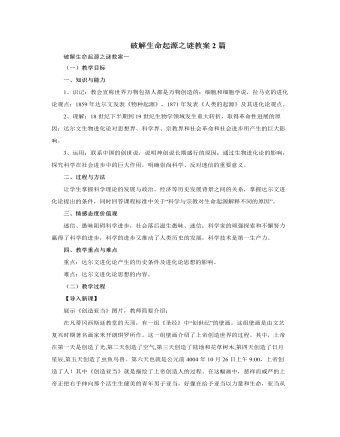
人教版高中历史必修3破解生命起源之谜教案2篇
设问:你怎么看待这个问题的?(这是达尔文没有想到的,是有人利用了达尔文的学说,科学应该与其区分开来,但是科学家在研究时,既要做到为追求真理不断探索,又要有一定的人文精神,比如我们只有以人为本,才能找到解决当今社会面临的诸如环保、战争、饥荒等问题的途径,才能构建防止核物理技术、克隆技术、信息技术、生物技术、太空技术等可能对人类造成不可逆转的破坏作用的思想基础、决策机制和社会条件。更重要的是社会和国家应该对此有足够的认识,正因为此,所以现在当一项科学发明出台后,就会有一些法律出台,限制其可能的非人道用途。但是这些影响应不成为我们进行科学探究的阻碍。)(3)科学与宗教的斗争设计意图:再次引导学生认识,科学的探索永无止境,同时也再次认识宗教和科学理论产生的原因。材料1:1972年,美国加利福尼亚教育部竟明文规定,中学生物学课本除进化论外,必须还有神创论的内容,而且两者的页数要各占一半。

